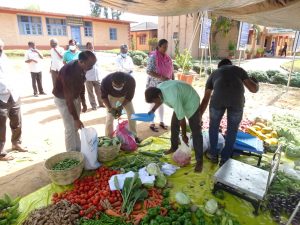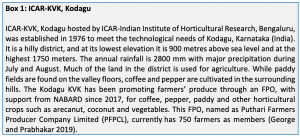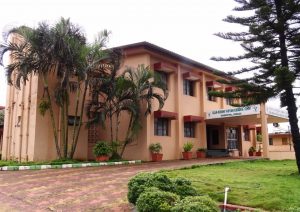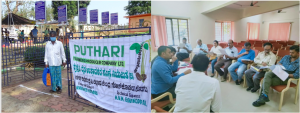While farmers face new challenges from the lockdown imposed due to the COVID-19 pandemic, local agricultural extension centres, such as Krishi Vigyan Kendras, have to step in and support farmers. In this note, Saju George, Prabhakar B and Subbaiah KP illustrate how ICAR-KVK Kodagu and Puthari FPO is supporting farmers to deal with these new challenges.
CONTEXT
The lockdown announced by the Government of India in the wake of the COVID-19 pandemic has thrown up unique challenges for farmers and farmer-related institutions. There is a sudden drop in demand for agricultural produce as movement of agricultural output has come to a standstill. The traditional market and supply chain of fruits and vegetables have come to a sudden grinding halt. Under this situation wherein there is a need to relieve farmers’ distress and help move farm produce, the government came up with subsequent clarifications that exempt agricultural produce and agricultural operations from lockdown restrictions. However, farmers are still facing problems because of the lack of transportation facilities to send their goods to other districts. It is a herculean task to send goods even to neighbouring districts, let alone other States.

Vegetable outlet operating at KVK during lockdown
The situation has been worsened by strict interstate border controls that have been implemented. There is a drastic reduction in the demand for high value vegetables due to closure of the hotel industry, and ban on large events. Though there was panic buying at certain points of time, it is difficult to predict the demand and market produce on a regular basis. The local institutions at the district level, such as Krishi Vigyan Kendras (KVKs) need to step up their efforts to help farmers. They need to connect farmers directly to consumers. ICAR-KVK Kodagu (Box 1) is playing an active role in addressing some of these challenges.

KVK INTERVENTIONS DURING COVID-19
Advisory Services:
The KVK is regularly providing agro advisories to help farmers maintain their farms through different WhatsApp groups, newspapers, radio and SMS services. KVK-Kodagu has disseminated crop specific advisories, general government advisories relating to agriculture, and Arogya Setu App to more than 7000 farmers through an mKisan portal message advisory, to 3800 farmers through different WhatsApp groups, and also through four local newspapers. A new service of online consultation has also been launched by the Community Service Centres (CSCs) under an MOU with ICAR, so that the farmers from remote areas need not visit KVKs. They can approach the CSCs established by the government and ask for timeslots to discuss their problems. The timing is determined in consultation with KVK online and farmers can directly interact with KVK scientists online. All KVK heads have been registered in the CSC advisory portal as per the MOU between ICAR and CSC. Farmers can take advantage of this facility by visiting the nearest CSC facility.
Supply of Planting Materials:
The KVK farm and nursery are functioning normally and the nursery is preparing high quality planting material of coffee, pepper and arecanut to cater to the demands of farmers. KVK is also preparing about 12,000 seedlings of pepper variety Arka Coorg Excel, 6000 coffee seedlings, and about 6000 arecanut seedlings of improved varieties.

ICAR-KVK, Kodagu
KVK AND FPO INTERVENTIONS DURING COVID-19
Agri input outlet at KVK:
The agri input outlet of Puthari FPO (initiated in September 2017), located at KVK Campus is functioning in compliance with the district administration’s directives. The outlet remains open from 7am to 12 noon on three days of the week (Monday, Wednesday and Friday). On average about 40 to 50 farmers are coming and purchasing critical inputs required for their farms. The outlet is mainly catering to their requirements of vegetables seeds, pesticides, fungicides, and plant nutrients like water soluble fertilizer, which are critical for maintaining plantation crops such as coffee and pepper. Apart from this agricultural machines – weed cutters, small farm implements, harvesting ladders – are also available in the outlet.
Farmers are advised to use hand sanitizers, face masks and social distancing while purchasing agricultural inputs. This also creates awareness among farmers about the importance of social distancing.
Sale of small farmer produce:
At the same time the outlet is also facilitating farmers in selling their animal products like eggs, thus providing an outlet to market these items, which have also suffered a price crash during this period. Added to this were the fears about the incidence of bird flu, which had erupted in the neighbouring districts of Kodagu.
Marketing of fruits and vegetables purchased directly from farmers:
The FPO was contemplating starting a rural mart which NABARD has already agreed to fund. But with this lockdown, the FPO has informally started that process by foraying into the marketing of fruits and vegetables that will greatly help both farmers and consumers. Whereas farmers are looking for minimum support price, consumers are looking for safe and fresh vegetables at reasonable prices. The FPO is purchasing vegetables and local fruits directly from local farmers and also from neighbouring Mysuru district, where the farmers have felt the blow of a sudden crash in vegetable prices. The FPO is voluntarily offering twenty per cent higher prices to such farmers while purchasing directly from them. The KVK has given space for marketing these vegetables inside the KVK campus itself, while maintaining all social distancing norms. The SMS staff from KVK and FPO staff insist upon carefully following the social distancing norms. Once again, the vegetable market is functioning on three days of the week (Monday, Wednesday and Friday) from 7am to 12 noon as per district administration guidelines. On average the FPO is selling INR 30,000 worth of vegetables on any day.
Coffee marketing:
In these difficult times the farmer members of the FPO can look forward to the coffee marketing initiative taken up by the FPO from this year onwards.The Board of Directors of Puthari FPO has given a call to its farmer members to contribute coffee to the FPO. The aggregation effort was started during February-March season. The FPO has already collected 1000 bags (50 tonnes) of coffee from its members. Sixty farmers have contributed coffee towards this end. This will be cured in a cooperative curing works at Hunsur operated by the Kodagu Coffee Growers Cooperative Society. From there this coffee will be auctioned to national and international buyers with support from the Coffee Board. If successful, this will be the first such export initiative from an FPO. Otherwise coffee marketing is very complex with well-entrenched private players where individual farmers cannot think of exporting their own coffee. As a result of this effort, the buyer can always trace back the origin of the coffee to a ‘farmers run FPO’ who are growing coffee in the most eco-friendly way.

Meeting of the Board of Director, PFPCL
Scaling up:
If the export initiative works well the model will be expanded by next year to cover all the 750 registered farmers (as on March 2020). A separate coffee marketing team will be formed by the FPO to scale up the export, and this will benefit a large group of coffee growers. If these initiatives bear fruit the farmers will have a lot of confidence in facing such calamities in future. They will be confident that whatever happens, the FPO is solidly behind them in helping them market their coffee and pepper produce. Thanks to all these reasons farmers will be able to realize higher incomes.
LESSONS
It must be noted that problems in every district within the country is unique and requires location-specific interventions. KVKs located in each district can help address – to some extent – some of these challenges faced by farmers. To do this, KVKs have to go beyond their normal mandate, and start mobilizing farmers into groups, strengthen their capacities (organizational, managerial and technical), and respond quickly to the new challenges that are emerging. It is our professional and moral responsibility too.
References
George S and Prabhakar B. 2019. AESA Good Practices 27: KVKs in support of producer companies. Agricultural Extension in South Asia. (Available online at https://www.aesanetwork.org/kvks-in-support-of-producer-companies/)

Dr Saju George is Principal Scientist and Head, ICAR-KVK, Kodagu. (Email: Saju.George@icar.gov.in)

Mr Prabhakar B is Subject Matter Specialist (Horticulture), at ICAR-KVK, Kodagu. (Email:iihrkvkgk@gmail.com)

Mr Subbaiah KP is the President of Puthari Farmers Producer Company Ltd, Gonikoppal, Kodagu. (Email: suryasubbaiahkp@gmail.com)









When we share our ideas, knowledge, practice as also the problems, we are contributing to problem solving & better life for everyone. So is this contribution, which is likely to give ideas to many other KVKs & FPOs,how best they can modeserve farming community under distress, especially by working in collaborative mode. Many other KVKs, FOs, agencies may consider publishing such notes for larger benefits. congratulations to authors & AESA for this timely note which is very well written.
“Excellent and timely help being provided by KVK ,Kodagu to the farmers in marketing their produce fruits, vegetables and eggs. Happy to learn that the KVK is involved in sale of critical inputs and also giving in proper advice to maintain hygiene and social distance. I wish the KVK will succeed in exporting coffee in the days to come. Many KVKs/ Extension organisations can help the farmers at this crucial juncture but what is required as the authors have pointed out is “ the staff have to feel it as their responsibility to help farmers”. I convey my best wishes to the authors who are doing yeoman service to the farmers”
Thanks to distinguished professionals for the encouraging words. After being associated with FPO starting from its birth to grooming, now at KVK feel that we can take up many farmer centric initiatives, which would not have been possible if we were working as KVK alone. As many KVKs have constraints of manpower etc.
Worthy example of how FPOs can raise to occasion and serve the society well. I feel FPOs are the dependable and helpful organizations of the farmers welfare in future. They need to to be promoted, supported with capital, leadership, skill and encouragement. Congratulations to the authors!
Dear All,
This field note has been well written and documented which is a worth way that KVKs can support the farmers during a pandemic. I appreciate Dr. Saju and his team @ KVK-Kodagu and the members of Puthari FPO for the initaitive. Above all to Dr. Rasheed sir for bringing out this timely field note. I took some personal interest to post this field note in the WhatsApp group of our ATARI, Zone -V and honestly few KVKs have started planning for such approaches. This field note will be in the hearts of our KVK professionals. A process documentation should be inbuilt in these type of activities to end with a note to say “this is the contribution of KVK to farmers during a pandemic”. As serving in the public sector, we have to be proactive towards bringing innovations in appraoches to handle situations like this and support farmers. Lastly, even in the KVK which I work (KVK-Khordha, ICAR-CIFA, Bhubaneswar, Odisha), we have started providing space to farmers to sell the farm produce. When my staffs saw this field note, there was a motivation to do this at our KVK. Many may start this process and wish that all KVKs of the country to perform this activity. This field note is inspiring.